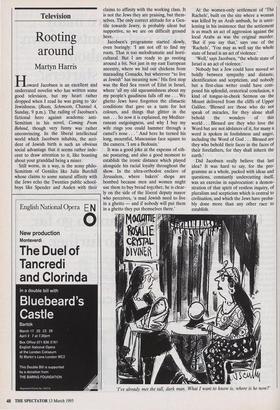Television
Rooting around
Martyn Harris
Howard Jacobsen is an excellent and underrated novelist who has written some good television, but my heart rather dropped when I read he was going to 'do' Jewishness. (Roots, Schmoots, Channel 4, Sunday, 9 p.m.). The railing of Jacobsen's fictional hero against academic anti- Semitism in his novel, Coming From Behind, though very funny was rather unconvincing. In the liberal intellectual world which Jacobsen inhabits, the acci- dent of Jewish birth is such an obvious social advantage that it seems rather inde- cent to draw attention to it, like boasting about your granddad being a miner.
Still worse, in a way, is the noisy philo- Semitism of Gentiles like Julie Burchill whose claims to some natural affinity with the Jews echo the Twenties public school- boys like Spender and Auden with their claims to affinity with the working class. It is not the Jews they are praising, but them- selves. The only correct attitude for a Gen- tile towards Jewry, is probably silent but supportive, so we are on difficult ground here.
Jacobsen's programme started slowly, even boringly: 'I am not off to find my roots. That is too melodramatic and horti- cultural. But I am ready to go rooting around a bit. Not just in my east European ancestry, where we hid our chickens from marauding Cossacks, but wherever "to live as Jewish" has meaning now.' His first stop was the Red Sea resort of Eilat in Israel, where 'all my old squeamishness about my my people's gaudiness falls off me . . . We ghetto Jews have forgotten the climactic conditions that gave us a taste for hot colours, and things that glitter in the sun . . . So now it is explained, my Mediter- ranean outgoingness, and why I buy my wife rings you could hammer through a camel's nose . . . ' And here he turned his long, mournful, Mancunian face square to the camera. 'I am a Bedouin.'
It was a good joke at the expense of eth- nic posturing, and also a good moment to establish the ironic distance which played alongside his racial loyalty throughout the show. In the ultra-orthodox enclave of Jerusalem, where bakers' shops are bombed because men and women might use them to buy bread together, he is clear- ly on the side of the liberal deputy mayor who perceives, 'a mad Jewish need to live in a ghetto — and if nobody will put them in a ghetto they put themselves there.' At the women-only settlement of 'The Rachels', built on the site where a woman was killed by an Arab ambush, he is unre- lenting in his insistence that the settlement is as much an act of aggression against the local Arabs as was the original murder. `But if you say that,' says one of the `Rachels', 'You may as well say the whole state of Israel is an act of violence.'
`Well,' says Jacobsen, "the whole state of Israel is an act of violence.'
Nobody but a Jew could have moved so boldly between sympathy and distaste, identification and scepticism, and nobody but a first-class writer could have com- posed his splendid, oratorical conclusion, a kind of tongue-in-cheek Sermon on the Mount delivered from the cliffs of Upper Galilee. 'Blessed are those who do not speak of miracles, for they alone shall behold the wonders of this world . . . Blessed are they who love the Word but are not idolaters of it, for many a word is spoken in foolishness and anger, including the Word of God . . . Blessed are they who behold their faces in the faces of their forefathers, for they shall inherit the earth.'
Did Jacobsen really believe that last idea? It was hard to say, for the pro- gramme as a whole, packed with ideas and questions, constantly undercutting itself, was an exercise in equivocation: a demon- stration of that spirit of restless inquiry, of pluralism and scepticism which is central to civilisation, and which the Jews have proba- bly done more than any other race to establish.
'I've already met the tall, dark man. What I want to know is, where is he now?'


























































 Previous page
Previous page